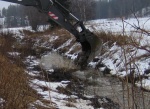Case study:Restoration of Kocksbybäcken brook: Difference between revisions
No edit summary |
No edit summary |
||
| (6 intermediate revisions by 3 users not shown) | |||
| Line 1: | Line 1: | ||
{{ | {{Case study status | ||
|Approval status= | |Approval status=Approved | ||
}} | }} | ||
{{Location | {{Location | ||
| Line 20: | Line 15: | ||
|Name of parent multi-site project=Case study: Restoration of Ingarsilanjoki River | |Name of parent multi-site project=Case study: Restoration of Ingarsilanjoki River | ||
|Multi-site=No | |Multi-site=No | ||
|Project picture=Kocksby after restauration (Liisa | |Project picture=Kocksby after restauration (Liisa Laitinen).jpg | ||
|Picture description= | |Picture description=Kocksbybäcken brook after restoration (photo:Liisa Hämäläinen) | ||
|Project summary=The Kocksbybäcken brook is a tributary of the Ingarskilanjoki River in Degerby village in the municipality of Inkoo. The catchment area of the brook is 11 km2. Kocksbybäcken brook was restored in the as the aim of enhancing the habitat diversity of the brook for migratory trout. The object was to support the natural development of the brook by adding sinousity and width and depth variation. Also stones and gravel were added and replaced to create habitats for the brown trout. The restored part was 330m Brook serves as a drainage channel for the surrounding agricultural fields | |Project summary=The Kocksbybäcken brook is a tributary of the Ingarskilanjoki River in Degerby village in the municipality of Inkoo. The catchment area of the brook is 11 km2. Kocksbybäcken brook was restored in the as the aim of enhancing the habitat diversity of the brook for migratory trout. The object was to support the natural development of the brook by adding sinousity and width and depth variation. Also stones and gravel were added and replaced to create habitats for the brown trout. The restored part was 330m Brook serves as a drainage channel for the surrounding agricultural fields | ||
In the case of Kocksbybäcken | In the case of Kocksbybäcken brook, only few trouts were found in the research section in 2005 before restoration. However, the number of juvenile trouts in the reference section downstream was exceptionally high, with 300 juveniles per 100 m². After restoration in 2006, only few trouts were found in the reference section and none in the restored section. One reason was that the year was too dry for juvenile trout production. In 2007 trout number increased in the restored section | ||
}} | |||
{{Image gallery}} | |||
{{Case study image | |||
|File name=Kocsby before restauration(Liisa Laitinen).jpg | |||
|Caption=Kocsbybäcken brook before restoration (photo: Liisa Hämäläinen) | |||
}} | |||
{{Case study image | |||
|File name=Kocksby restaurations(Liisa Laitinen).jpg | |||
|Caption=Restoration of Kocksbybäcken brook (photo: Liisa Hämäläinen) | |||
}} | }} | ||
{{Image_gallery_end}} | |||
{{Toggle button}} | |||
{{Toggle content start}} | |||
{{Case_study_subcatchment | {{Case_study_subcatchment | ||
|Subcatchment= | |Subcatchment= | ||
| Line 103: | Line 108: | ||
}} | }} | ||
{{Measures | {{Measures | ||
|Bank and bed modifications measure= | |Bank and bed modifications measure=Adding sinuosity,Re-introducing stones, Introduction of gravel, | ||
}} | }} | ||
{{Hydromorphological_quality_elements_header}} | {{Hydromorphological_quality_elements_header}} | ||
| Line 151: | Line 141: | ||
{{Monitoring_documents}} | {{Monitoring_documents}} | ||
{{Monitoring_documents_end}} | {{Monitoring_documents_end}} | ||
{{Additional_Documents}} | {{Additional_Documents}} | ||
{{Additional_Documents_end}} | {{Additional_Documents_end}} | ||
| Line 189: | Line 169: | ||
}} | }} | ||
{{Case_study_upload}} | {{Case_study_upload}} | ||
{{Toggle content end}} | |||
Latest revision as of 12:38, 1 June 2017
Project overview
| Status | Complete |
|---|---|
| Project web site | |
| Themes | Fisheries, Habitat and biodiversity |
| Country | Finland |
| Main contact forename | Jukka |
| Main contact surname | Jormola |
| Main contact user ID | |
| Contact organisation | SYKE |
| Contact organisation web site | http://www.environment.fi |
| Partner organisations | |
| Parent multi-site project | |
| This is a parent project encompassing the following projects |
No |
Project summary
The Kocksbybäcken brook is a tributary of the Ingarskilanjoki River in Degerby village in the municipality of Inkoo. The catchment area of the brook is 11 km2. Kocksbybäcken brook was restored in the as the aim of enhancing the habitat diversity of the brook for migratory trout. The object was to support the natural development of the brook by adding sinousity and width and depth variation. Also stones and gravel were added and replaced to create habitats for the brown trout. The restored part was 330m Brook serves as a drainage channel for the surrounding agricultural fields
In the case of Kocksbybäcken brook, only few trouts were found in the research section in 2005 before restoration. However, the number of juvenile trouts in the reference section downstream was exceptionally high, with 300 juveniles per 100 m². After restoration in 2006, only few trouts were found in the reference section and none in the restored section. One reason was that the year was too dry for juvenile trout production. In 2007 trout number increased in the restored section
Monitoring surveys and results
Lessons learnt
Image gallery
|
Catchment and subcatchmentSelect a catchment/subcatchment
Catchment
Subcatchment
Site
Project background
Cost for project phases
Reasons for river restoration
Measures
MonitoringHydromorphological quality elements
Biological quality elements
Physico-chemical quality elements
Any other monitoring, e.g. social, economic
Monitoring documents
Additional documents and videos
Additional links and references
Supplementary InformationEdit Supplementary Information
| |||||||||||||||||||||||||||||||||||||||||||||||||||||||||||||||||||||||||||||||||||||||||||||||||||||||||||||||||||||||||||||||||||||||||||||||||||||||||||||||||||||||||||||||||||||||||||||||||||||||



